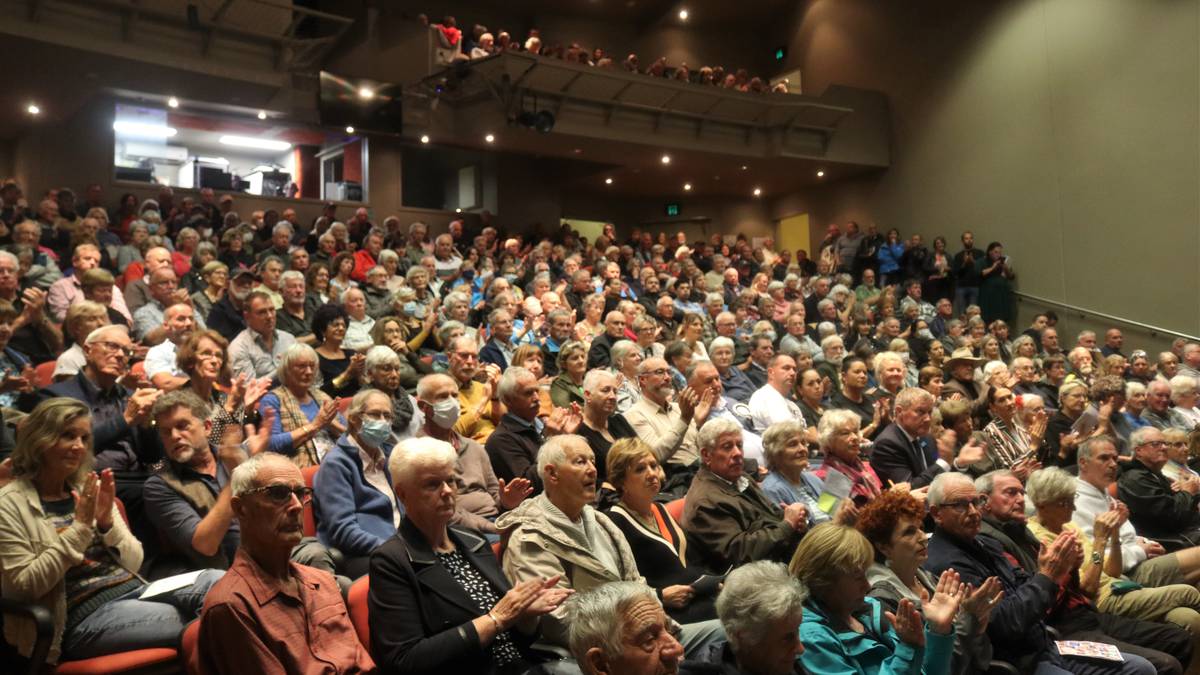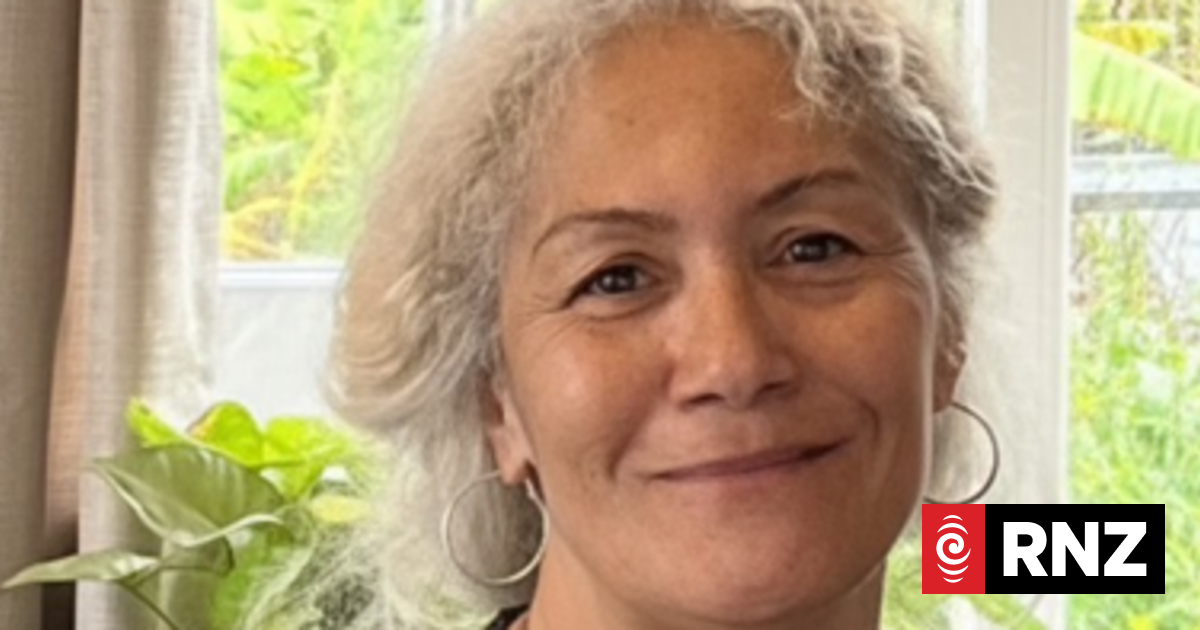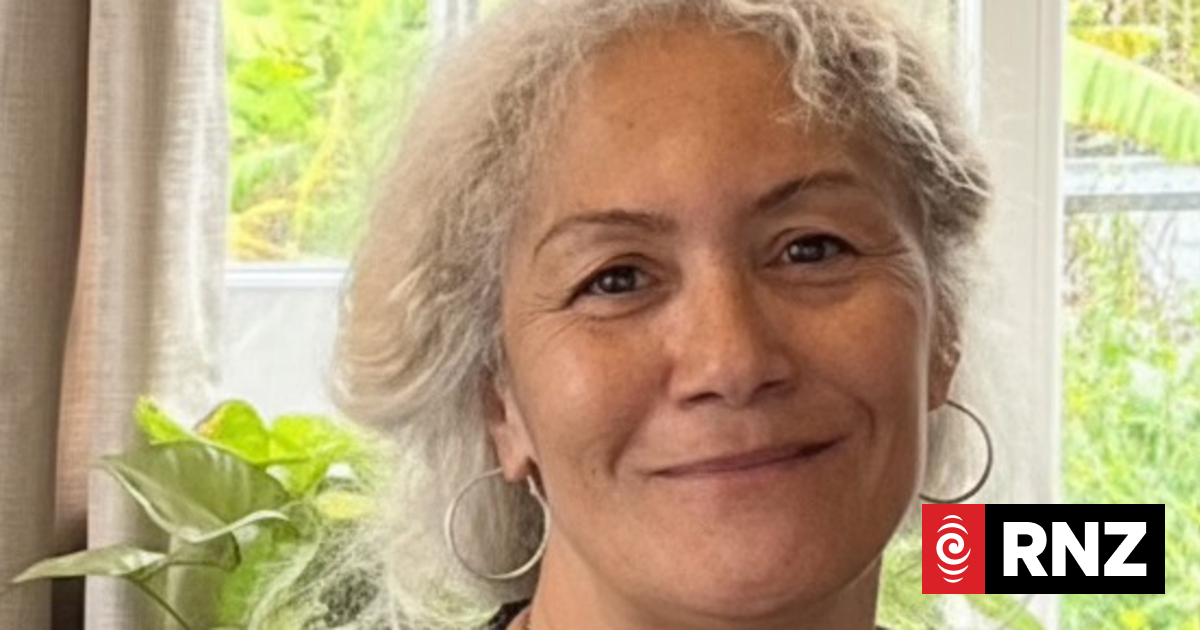The 400-seat Turner Centre auditorium was packed, with hundreds more forced to follow the meeting on a large screen in the theatre bar. Photo / Peter de Graaf
Kerikeri’s biggest public meeting in living memory drew almost 800 people to the Turner Centre on Wednesday night to hear about Kāinga Ora’s plans for social housing in the town.
Such a crowd turned out
that many had to stand in the auditorium, which has over 400 seats, and hundreds followed the meeting on a big screen set up in the theatre bar. Another 375 watched the live-streamed discussion online.
A rare traffic jam ensued as hundreds of vehicles converged on Cobham Rd ahead of the 5.30pm start, despite heavy rain.
The event was organised by community groups Our Kerikeri and Vision Kerikeri amid concerns about the Government housing agency’s proposals for high-density housing in the town centre.
The meeting was touted as a chance for townsfolk to get informed about the agency’s plans, but neither Kāinga Ora, the Ministry of Housing and Urban Development nor the developers, Gemscott, took part.
Kāinga Ora, formerly Housing NZ, said it couldn’t attend because it had a duty to be politically neutral and the meeting, which ended with a panel featuring candidates standing in the upcoming general election, was “inherently party-political”.
Chairs labelled Kāinga Ora and Gemscott, among others, were pointedly left empty on stage.
Our Kerikeri chairwoman Annika Dickey began the meeting with what was known about the proposals, in particular on three adjoining properties on Clark Rd and King St.
Advertisement
The Clark Rd plan includes Kerikeri’s first three-storey apartment block and eight duplex townhouses.
Dickey said she felt torn by Kāinga Ora’s plans because Northland had a serious housing crisis and Kerikeri had to play its part in the solution — but she was also concerned that rushed plans to address the problem could have unintended, irreversible effects.
The proposal was of a scale and density not yet seen in Kerikeri and could affect long-standing plans for a ring road around the town centre.
The revelation Kāinga Ora had previously made a submission to the Far North District Council asking for a plan change to allow buildings of up to six storeys drew a collective gasp from the audience.
Dickey said Kerikeri was being treated as if it was a city — Gemscott even kept referring to it that way — but it only had the resources and infrastructure of a small town.
/cloudfront-ap-southeast-2.images.arcpublishing.com/nzme/2R3JR3FY7ZEVLE6CXGGAX2BPWA.jpg)
There was, however, also some good news for concerned townsfolk.
Kāinga Ora had committed to working with the community on its plans for 115 Kerikeri Rd, a newly purchased property bordered on three sides by Kerikeri Retirement Village.
Also, Vision Kerikeri chairwoman Jo Lumkong said the council had decided to hand over to an independent commissioner the contentious decision of whether resource consents for the Clark Rd development should be publicly notified.
Advertisement
Those who did agree to be part of a panel taking questions from organisers and the audience were council chief executive Blair King, Far North Mayor Moko Tepania and councillors Ann Court, Babe Kapa and Steve McNally, along with Felicity Foy via Zoom.
Questions included why the council hadn’t brought back development contributions to make sure developers paid a fair share of infrastructure costs and whether Kerikeri’s new sewage plant could handle the extra load, a discussion that prompted some inadvertent toilet humour.
Kerikeri resident Brian Strahan’s disappointment over Kāinga Ora’s absence drew loud applause, as did Dover Samuels’ demand the council “steel up” against the developers and make sure the proposal was publicly notified.
Tepania responded by saying the council was bound by the Resource Management Act and the audience’s cheers would quickly turn to boos if the council, and ratepayers, were dragged into a costly court case.
Court, meanwhile, gave a lucid explanation about the roadblocks facing Kerikeri’s long-stalled ring road proposal.
/cloudfront-ap-southeast-2.images.arcpublishing.com/nzme/UOXN3PLP4FH2JKOLJZSMXVLIJY.jpg)
With 782 people signing in, Dickey said the crowd was much bigger than she had anticipated.
“It clearly shows there is concern about the potential change and whether we are ready for it … we all know we need more housing and that Kerikeri is a very expensive place to live. We just have to get it right,” she said.
The meeting ended with a political panel in which Grant McCallum (Northland candidate for National) criticised Kāinga Ora for not fronting up or consulting enough, while Reina Tuai Penney (Greens) urged aroha for people who needed public housing.
Shane Jones (NZ First) said he was “sick of Kāinga Ora guilt-tripping neighbours” into agreeing to their developments, and Matt King (Democracy NZ) said the proposal would be a “disaster” for Kerikeri, given Kāinga Ora’s policy of not evicting even the most troublesome tenants.
“You’ll have gang members living in these places … Social housing buildings look really good when the builders have just left, but they turn into slums,” he said.
Labour MPs Kelvin Davis and Willow-Jean Prime were to have taken part via Zoom but were instead kept busy in Wellington due to the resignation of fellow minister Meka Whaitiri.
/cloudfront-ap-southeast-2.images.arcpublishing.com/nzme/IAHX4FBHJVAKHP7LDEIGKNSDNE.jpg)
/cloudfront-ap-southeast-2.images.arcpublishing.com/nzme/M7UGP5PE4BBYFF4RIM3UQA27TQ.jpg)




